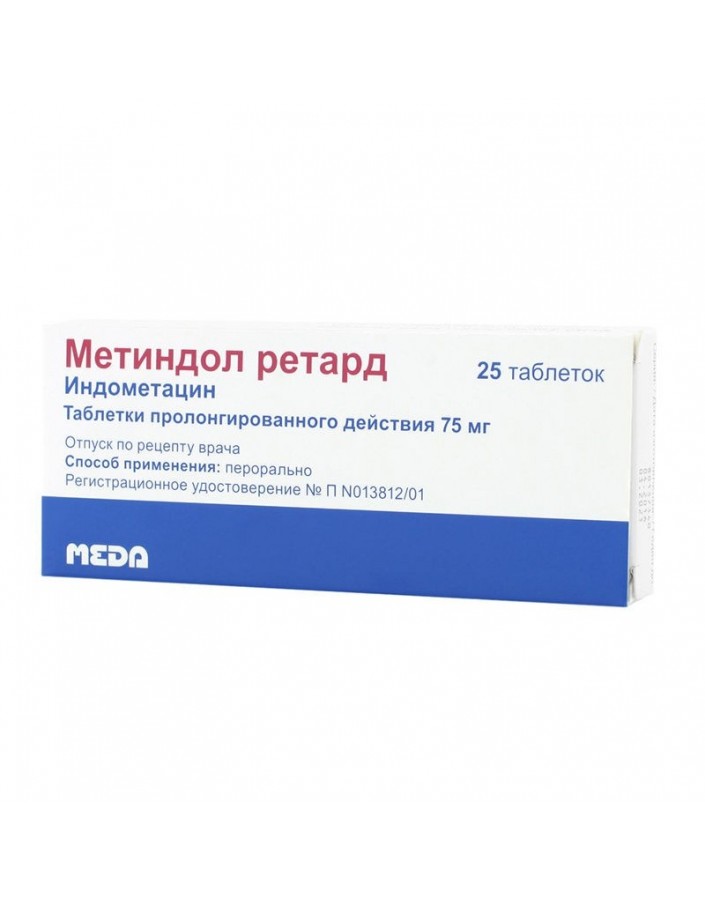




Security policy (edit with Customer reassurance module)

Delivery policy (edit with Customer reassurance module)

Return policy (edit with Customer reassurance module)
Pills
In 1 pill of the prolonged action contains:
- Active substance
- Indomethacin 75 mg.
- Excipients Microcrystalline cellulose, potato starch, methacrylic acid copolymer, talc, Magnesium stearate.
In the blister pack of 25 tablets. In packing 1 blister.
Metindol retard has anti-inflammatory, analgesic and antipyretic effects. The mechanism of action of the drug is associated with inhibition of the activity of the enzyme cyclooxygenase and a decrease in the synthesis of prostaglandins, causing the appearance of pain, an increase in temperature and an increase in tissue permeability in the inflammatory focus.
In articular syndrome, Methindol retard reduces inflammation and relieves pain at rest and during movement, reduces morning stiffness and swelling of joints, and contributes to an increase in the range of motion.
- Symptomatic therapy of inflammatory diseases accompanied by pain.
- Ankylosing spondylitis (ankylosing spondylitis) and other inflammatory-rheumatic diseases of the spine.
- Gouty arthritis.
- Rheumatoid arthritis.
- Pain in diseases of the spine.
- Rheumatic diseases of soft tissues.
- Pain and inflammation after injuries and surgical interventions (gynecological, dental, etc.).
- Congenital heart defects (severe coarctation of the aorta, pulmonary artery atresia, severe Fallot tetrad), the drug is contraindicated in the period after coronary artery bypass surgery.
- Blood coagulation disorders, including:
- Hemophilia.
- Lengthening bleeding time.
- Tendency to bleed.
With caution:
- Coronary heart disease.
- Cerebrovascular diseases.
- Blood disorders (leukopenia and anemia).
- Congestive heart failure.
- Dyslipidemia / hyperlipidemia.
- Thrombocytopenia.
- Diabetes.
- Diseases of peripheral arteries.
- Arterial hypertension.
- Smoking.
- Cirrhosis of the liver with portal hypertension.
- Creatinine clearance less than 60 ml / min immediately after surgery.
- Availability of amnestic data on the development of ulcerative lesions of the gastrointestinal tract.
- The presence of Helicobacter pylori infection.
- Elderly age.
- Prolonged use of NSAIDs.
- Frequent alcohol use.
- Severe somatic diseases.
- Concomitant therapy following drugs: anticoagulant (e.g., warfarin), antiplatelet agents (e.g., Aspirin, clopidogrel), oral corticosteroids (e.g., prednisone), selective serotonin reuptake inhibitors (e.g., citalopram, Fluoxetine, paroxetine, sertraline).
- Patients suffering from mental disorders, depression, parkinsonism, epilepsy.
To reduce the risk of adverse effects, use the minimum effective dose with the shortest possible short course.
Contraindicated.
Metindol retard is taken orally, without chewing, during or immediately after a meal, drinking plenty of water or milk.
- Adults: 1 or 2 pills per day, depending on the severity of the disease and individual sensitivity. Do not exceed the dose of more than 150 mg per day.
- On the part of the digestive system, NSAIDs-gastropathy, abdominal pain, nausea, vomiting, heartburn, loss of appetite, diarrhea, abnormal liver function (increased activity of "liver" transaminases, hyperbilirubinemia), ulceration of the gastrointestinal mucosa (including with perforation and / or bleeding).
- From the nervous system Headache, dizziness, insomnia, agitation, irritability, excessive fatigue, drowsiness, depression, peripheral neuropathy.
- On the part of the senses: Impaired taste, hearing loss, tinnitus, diplopia, blurred vision, corneal clouding, conjunctivitis.
- From the side of the cardiovascular system. Development (aggravation) of the phenomena of chronic heart failure, tachyarrhythmia, edematous syndrome, increased blood pressure.
- From the urinary system Renal dysfunction, proteinuria, hematuria, interstitial nephritis, nephrotic syndrome, papilla necrosis.
- From the side of blood-forming organs and hemostasis system Bleeding (gastrointestinal, gingival, uterine, hemorrhoidal), anemia (including hemolytic and aplastic), leukopenia, thrombocytopenia, eosinophilia, agranulocytosis, thrombocytopenic purpura.
- Allergic reactions Skin rash, itchy skin, urticaria, angioedema, bronchospasm; in isolated cases - photosensitization, toxic epidermal necrolysis (Lyell's syndrome), erythema nodosum, anaphylactic shock.
- Laboratory indicators Agranulocytosis, leukopenia, thrombocytopenia, hyperglycemia, glycosuria, hyperkalemia.
- Other (more often in patients with autoimmune diseases), increased sweating, aplastic anemia, autoimmune hemolytic anemia.
During treatment, it is necessary to control the picture of peripheral blood and the functional state of the liver and kidneys.
If necessary, determine the 17-ketosteroids drug should be canceled 48 hours before the study.
For the prevention and reduction of dyspeptic symptoms, antacid drugs should be used.
- Impact on the ability to drive vehicles and control mechanisms During the period of treatment, care must be taken when driving vehicles and engaging in other potentially hazardous activities that require increased concentration of attention and psychomotor speed.
Increases plasma concentration of Digoxin, Methotrexate and lithium preparations, which can lead to increased toxicity.
Ethanol, colchicine, corticosteroids and corticotropin increase the risk of Gastrointestinal bleeding.
Enhances the hypoglycemic effect of insulin and oral hypoglycemic drugs; increases the effect of indirect anticoagulants, antiplatelet agents, thrombolytics (alteplazy, streptokinase and urokinase) - there is a risk of bleeding.
Reduces the effect of diuretics, with the use of potassium-sparing diuretics increases the risk of hyperkalemia; reduces the effectiveness of uricosuric and antihypertensive drugs (includingbeta blockers); enhances the side effects of glucocorticosteroids, Acetylsalicylic acid, estrogen, other NSAIDs.
Cyclosporine and gold preparations increase nephrotoxicity (obviously, due to the suppression of the synthesis of prostaglandins in the kidneys).
Cefamendol, cefaperazon, cefotetan, valproic acid, plykamycin increase the incidence of hypoprothrombinemia and the risk of bleeding.
Antacids and colestyramine reduce the absorption of indomethacin.
Enhances the toxicity of zidovudine (due to inhibition of metabolism); in newborns increases the risk of toxic effects of aminoglycosides (because it reduces renal clearance and increases the concentration in the blood).
Simultaneous use with serotonin reuptake inhibitors increases the risk of gastrointestinal bleeding.
Myelotoxic drugs increase the hematotoxicity of the drug.
Combined use with Paracetamol increases the risk of nephrotoxic effects.
- Symptoms: nausea, vomiting, severe headache, dizziness, memory impairment and disorientation. In more severe cases, paresthesias, numbness of the extremities and convulsions are observed.
- Treatment: consists in the rapid elimination of the drug from the body and the use of appropriate symptomatic agents. Indomethacin cannot be excreted through hemodialysis.
- Store in a dry, dark place at a temperature of 15-25 ° C.
- Keep out of reach of children.
- Do not use after expiration date.